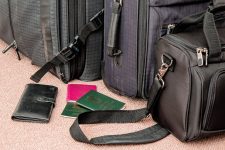Father Convicted After Buying Gifts For His Son

Australia has perhaps the strictest quarantine laws in the world.
We even have the TV show Border Security, where we can watch people get into trouble for infringing them.
The long list of things that are not allowed into the country can sometimes be overwhelming. While most of these rules are in place for good reason, sometimes innocent people can get caught out.
My client was coming back to Sydney from his trip to Japan and was randomly stopped and searched as he was going through customs.
The search revealed a paintball mask, vest and camouflage T-Shirt, along with a plastic BB gun, plastic BB ammunition, and nunchucks.
He was subsequently charged for importing items considered to be prohibited weapons under both NSW and Commonwealth law.
At first glance, it is possible to see why these items were viewed with suspicion.
However my client had an innocent explanation as to why he was carrying them.
He is a single parent to three children.
His 16-year-old son, who is a paintball enthusiast and spends a fortune on hiring a paintball gun and ammunition along with the gear, requested that his father (my client) bring back paintball ammunition, gun, mask and other gear.
When my client arrived in Japan, he entered a toyshop which was selling paintball guns, ammunition and gear.
The paintball gun was too heavy and expensive, so instead, he purchased the next best thing for his son – a BB gun and BB ammunition along with a mask to cover his face and T-shirt.
Believing these items to be toys, as they were made of extremely light plastic material, he packed these into his luggage.
My client is also a gifted martial arts teacher.
Whilst on his Japan trip, he was also honoured to receive the prestigious promotion of master during a ceremony.
At this ceremony, he also received a gift from the association – a very light nunchuck, which far from having any sinister purpose, has a symbolic importance.
Along with this he received a certificate to acknowledge his accomplishment.
This item, like the others, were also packed into his luggage.
Whilst at the airport, he declared the cigarettes he had packed, but innocently failed to declare his other items, completely unaware that he was committing an offence.
Unfortunately, he was stopped, arrested and interrogated for some hours before being released.
Not only extremely embarrassed, my client lost the items, which were seized and destroyed.
He was given a court attendance notice to attend court to face his charges.
Ever since this date, his son felt extremely guilty for requesting his father bring him these gifts.
My client encouraged his son to paintball games as it promotes teamwork, friendship and keeps him away from negative things in our society such as drugs, particularly in remote country locations.
Possession of prohibited weapons is a strict liability offence, which means that a person does not need to have an intention to commit the offence: the fact that the action has been done is all that is necessary to prove guilt.
Ignorance of the law is no excuse to strict liability offences.
The Local Court Magistrate thought long and hard about giving him a section 10 (now section 10 dismissal or conditional release order), which would have allowed him to remain conviction free.
But despite my pushing and pushing, she ultimately decided against it.
In her opinion, the offence required her to use my client as a vehicle to set an example to the community to stop others from importing items like this into Australia.
This is called ‘general deterrence’.
It was because of this fact alone she imposed a fine upon him, which in NSW must necessarily come with a criminal conviction.
An appeal is now being considered during which I will be arguing again for a non conviction order, which is where a person is guilty but no conviction is recorded against them.
Of course, it is ultimately up to my client as to whether he wishes to appeal – but I have offered to do the appeal for free as I do not believe it would be fair for him to receive a criminal conviction for his innocent mistake.






